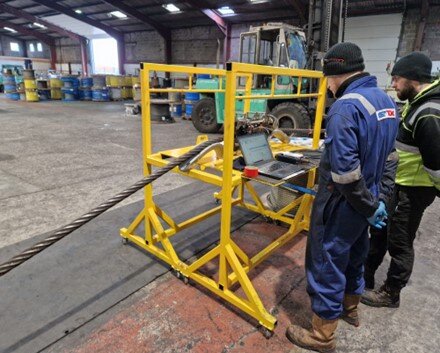
Case Study: Magnetic Rope Testing (MRT) for Steel Wire Ropes in the Oil and Gas Industry
Client Overview:
Our client, based in Aberdeen, Scotland, is a leading supplier of products and services destined for critical applications in the oil and gas industry. The client stipulated a need to have the steel wire ropes they purchase from Certex UK, inspected prior to being shipped offshore. Our client recognises the harsh conditions these ropes will endure in the North Sea, and the Oil and Gas industries consistent prioritisation over quality and safety.
Client Challenge:
The client required a reliable method to ensure the integrity of the steel wire ropes before deployment in the North Sea. Given the demanding environment and the safety-critical nature of the application, it was essential to identify any potential defects or weaknesses in the ropes prior to use.
Solution: Magnetic Rope Testing (MRT) Inspection
To meet the client's needs, our team proposed conducting Magnetic Rope Testing (MRT) inspections on the newly supplied steel wire ropes. MRT is a non-destructive, magnetic, and contactless procedure designed specifically to detect critical flaws such as broken wires, distortions, and corrosion within steel wire ropes.
Implementation:
- Pre-Inspection Preparation: Before shipment, the steel wire ropes were subjected to thorough MRT inspections in our Montrose based manufacturing facility.
- MRT Inspection Process: The MRT procedure involved utilising advanced magnetic technologies to scan the entire length of each rope. This enabled the detection of hidden defects that could compromise the rope's structural integrity during service.
- Analysis and Reporting: Our skilled technicians meticulously analysed the MRT data to identify any anomalies or irregularities within the wire ropes. Detailed reports were generated for each inspected rope, providing comprehensive insights into its condition.
Outcome:
The MRT inspections revealed critical information about the quality and reliability of the steel wire ropes:
- Early Detection of Defects: The MRT inspections can detect broken wires, distortions, and corrosion that are not visible to the naked eye.
- Quality Assurance: By conducting MRT inspections prior to shipping, our client could be assured they are receiving high-quality, defect-free products that are ready and fit for purpose to be deployed to the harsh conditions of the North Sea
- Safety and Reliability: Identifying potential issues before deployment in the North Sea contributes to enhancing safety and reliability in offshore operations.
Benefits for the Client:
- Reduced Risk: Proactive identification of defects minimises the risk of unexpected failures or accidents during offshore operations.
- Customer Confidence: Demonstrating a commitment to delivering reliable and safe products for critical applications.
Conclusion:
Magnetic Rope Testing (MRT) proves to be an invaluable tool for ensuring the quality and safety of steel wire ropes destined for the challenging conditions of the North Sea, and the oil and gas industry. By leveraging advanced non-destructive testing techniques, our client was able to deliver superior products with confidence and reliability.



